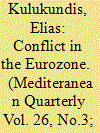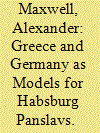| Srl | Item |
| 1 |
ID:
141803


|
|
|
|
|
| Summary/Abstract |
The crisis of the eurozone has narrowed to a conflict between Greece and Germany. At times it has appeared to be a family quarrel with all the animosity that a family can generate. The two are like an elderly father and an adolescent son unable to talk to each other. The son questions everything and wants to engage in dialogue, but his provocative watiy of framing questions drives the father to exasperation. The father answers questions with maxims and mantras, and his refusal to engage in dialogue impels the son to further provocation.
|
|
|
|
|
|
|
|
|
|
|
|
|
|
|
|
| 2 |
ID:
184404


|
|
|
|
|
| Summary/Abstract |
In the early 19th century, Habsburg Panslavs sought not Russian expansion but instead linguistic and cultural unity between Slavs speaking different “dialects.” To make their vision of literary unity despite political fragmentation more persuasive, Panslavs invoked the examples of Ancient Greece and modern Germany. Greek and German examples feature prominently in the writings of Jernej Kopitar, Josef Šafařík, Jan Kopitar, and Jan Kollár, all of whom posited a single Slavic “language.” The 1848 Revolution, however, transformed Slavic literary activism: Slavs at the Prague Panslav congress understood each other only poorly, and Habsburg authorities showed a sudden willingness to use Slavic in state administration. Some Slav patriots, including Josef Podstránský, Václav Krolmus and Peter Hitzinger, focused on particularist literary work, others, such as Ľudovít Štúr and Imbro Tkalac, took an interest in the Russian literary standard. The Greek and German examples remained popular, but were invoked with different purpose.
|
|
|
|
|
|
|
|
|
|
|
|
|
|
|
|